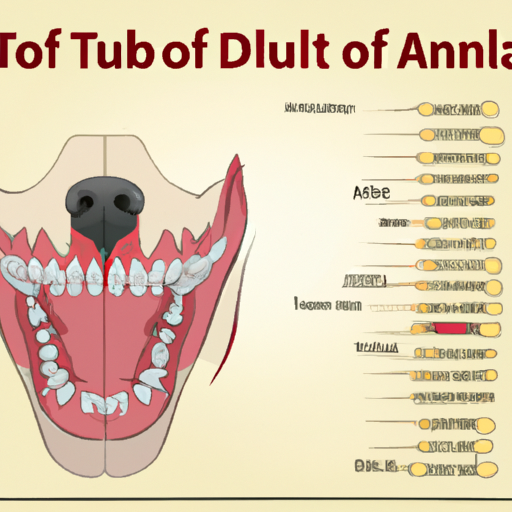Understanding Canine Dental Anatomy
Most people don’t spend a lot of time thinking about their dog’s teeth. But as a caregiver, you should know that a dog’s mouth is as complex and individual as a human’s. Like you, your furry friend uses their teeth for more than just grinding food. They use them to play, communicate, and explore the world.
Adult dogs typically have 42 teeth: 20 in the upper jaw and 22 in the lower. This is significantly more than the 32 teeth you have in your mouth, assuming you still have your wisdom teeth!
| Dog’s Jaw | Number of Teeth |
|---|---|
| Upper | 20 |
| Lower | 22 |
The Importance of Dental Care for Dogs
Just as you brush your teeth daily, dental care is crucial for your pet. Poor oral hygiene can lead to a myriad of health issues, from bad breath and tooth loss to more serious conditions like heart, liver, and kidney diseases.
Below are some steps to ensure your dog’s dental health:
- Regular brushing: Aim to brush your dog’s teeth daily or at least several times a week.
- Vet check-ups: Schedule regular dental check-ups with your vet.
- Dental chews and toys: Provide dental chews and toys that help promote oral health.
Spotting Dental Problems in Dogs
Being observant and proactive can save your dog a lot of discomfort and prevent more serious dental problems. As a caregiver, keep a watchful eye for signs of dental issues. These can include:
- Bad breath
- Loose or broken teeth
- Extra teeth or retained baby teeth
- Discolored teeth
- Refusal to eat or difficulty eating
The Role of Diet in Your Dog’s Dental Health
What your dog eats plays a significant role in their oral health. Certain foods and treats can help keep your dog’s teeth clean and healthy. A balanced diet, combined with dental chews and certain types of toys, can help reduce plaque and tartar buildup.
Frequently Asked Questions
Q: At what age do dogs get their adult teeth?
A: Puppies start getting their adult teeth around four months of age.
Q: How often should I brush my dog’s teeth?
A: Ideally, you should brush your dog’s teeth daily. However, brushing several times a week can also be beneficial.
Q: What should I do if my dog has a broken tooth?
A: If your dog has a broken tooth, it’s important to take them to the vet as soon as possible. Broken teeth can be painful and can lead to infections.
Q: Can a dog’s teeth grow back?
A: No, adult dogs do not regrow teeth. If a dog loses a tooth, it’s gone for good.
Remember, as a caregiver, you play a crucial role in your dog’s dental health. Regular care and observation can ensure your furry friend maintains a healthy mouth and leads a happy, comfortable life.



